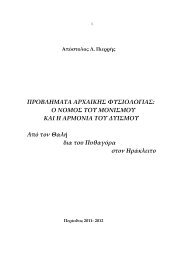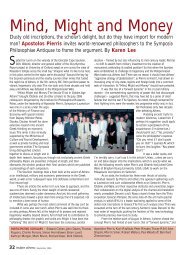20in its elf (apart from <strong>the</strong> ordering influence <strong>of</strong> <strong>the</strong> One functi<strong>on</strong>ing as regulatingprinciple) is not some-<strong>on</strong>e-thing ex hypo<strong>the</strong>si.Pro<strong>of</strong> <strong>of</strong> <strong>the</strong> sec<strong>on</strong>d point: <strong>the</strong>y can not be many causes (<strong>of</strong> <strong>the</strong>mselves). Forsince in <strong>the</strong>ir pristine, unc<strong>on</strong>taminated c<strong>on</strong>diti<strong>on</strong> <strong>the</strong>y a re totally un-coordinated (achaotic mess – if <strong>on</strong>e can speak even <strong>of</strong> a chaotic mess), it is not possible that“any<strong>on</strong>e” [44] <strong>of</strong> <strong>the</strong>m can be a cause <strong>of</strong> any o<strong>the</strong>r; and <strong>the</strong> same is proven by <strong>the</strong>c<strong>on</strong>siderati<strong>on</strong> that were it so, we would end by making “<strong>on</strong>e and th e same” itemsimultaneously cause and effect in <strong>the</strong> same respect [45]. So, if at all, each <strong>on</strong>ewould be cause <strong>of</strong> itself. But <strong>the</strong>ir multiplicity as such would still remain uncaused;and we were investigating about <strong>the</strong> cause <strong>of</strong> πολλὰ, qua πολλά.So that cause is nei<strong>the</strong>r <strong>the</strong> Μηδέν, nor <strong>the</strong> Πολλά. It has, <strong>the</strong>refore, to be <strong>the</strong>One.This exactly was <strong>the</strong> procedure – urges <strong>the</strong> objector. From which it is clearlyseen that <strong>the</strong>re is no need <strong>of</strong> anything else than <strong>the</strong> One, as cause <strong>of</strong> <strong>the</strong> πολλά (Ἅλφου γὰρ οὐδενός… ἢ τοῦ ἑνὸς 5.6); <strong>the</strong>refore <strong>on</strong>ly <strong>the</strong> One is cause above <strong>the</strong>πολλά – and nothing else ( διὸ μόνον τὸ ἓν αἴτιον τῶν πολλῶν 5.6-7); in fact thiswas <strong>the</strong> reas<strong>on</strong> for which we at all posited <strong>the</strong> One as αἴτιον to begin with, <strong>the</strong>se are<strong>the</strong> <strong>on</strong>ly and sole credentials for <strong>the</strong> sovereignty <strong>of</strong> <strong>the</strong> One ( διὸ καὶ τὸ ἕν πάντων αἴτιον, ὅτι τῶν πολλῶν αἴτιον δεῖ μόνον εἶναι τὸ ἕν 5.7-8). So what are <strong>the</strong> credentialsfor a principle bey<strong>on</strong>d <strong>the</strong> One? What necessity necessitates us to posit such afur<strong>the</strong>r principle [46].5.9. There is an anwkard textual situati<strong>on</strong> here (see my textual note ad loc.).Perhaps we might read: ᾗ γὰρ ἀσύντακτα, [ καὶ] πῶς ἓν αἴτιον ἔσται τὰ πολλά; Orindeed: ἦ γὰρ ἀσύντακτα (for verily <strong>the</strong>y (<strong>the</strong> πολλά) are un-coordinated), καὶ πῶςetc. Perhaps also, but I do not think it is likely, <strong>the</strong>re is a lacuna here, to be suppliedso as to give <strong>the</strong> following sense, “The πολλά cannot be an ultimate cause; for ei<strong>the</strong>r<strong>the</strong>y are coordinated or not; if <strong>the</strong> former, <strong>the</strong>n <strong>the</strong>re must be something which coordinates<strong>the</strong>m, for in <strong>the</strong>mselves <strong>the</strong>y cannot generate order; if <strong>the</strong> sec<strong>on</strong>d, how can<strong>the</strong>y be <strong>on</strong>e αἴτιον, since <strong>the</strong>y are totally and absolutely unc<strong>on</strong>nected, so that <strong>the</strong>reis no sense in which <strong>the</strong>y possess a unity <strong>of</strong> whatever kind or degree”.5.14-9.10. Here is D.’s reply to <strong>the</strong> objectio n urged above that <strong>the</strong> Onesuffices as an ultimate principle.
21He begins by acknowledging <strong>the</strong> force <strong>of</strong> <strong>the</strong> objecti<strong>on</strong> (5.17-18). He himselfputs in <strong>the</strong> mouth <strong>of</strong> <strong>the</strong> objector, what he evidently thinks is a str<strong>on</strong>g point, namelythat if <strong>the</strong> One is <strong>the</strong> very limi t at which our c<strong>on</strong>ceiving powers (and <strong>the</strong>se whenutterly strained for that matter) can reach, how can we entertain at all <strong>the</strong> noti<strong>on</strong> <strong>of</strong>something bey<strong>on</strong>d <strong>the</strong> One. Obviously D. is far from Mysticism, in <strong>the</strong> modernEuropean sense <strong>of</strong> <strong>the</strong> term, he is a thorough Greek Rati<strong>on</strong>alist. [47]The formulati<strong>on</strong> in 5.17-20, leaves no doubt that <strong>the</strong> issue was deeply felt byD.: “We must begin with what is nearer to us and more graspable by our mind ( ἐκ τῶν ἡμῖν γνωριμωτέρων) [48], and building <strong>on</strong> this secure for our understa ndingfoundati<strong>on</strong>, we must accustom ( ἀνεθιστέον) our mental unformulable travails, <strong>the</strong>anguish and pangs <strong>of</strong> a birth which cannot come to pass, to <strong>the</strong> ineffable awarenessor apprehensi<strong>on</strong> <strong>of</strong> that proud, sublime Truth” [49].5.19-20. οὐκ οἶδα ὅπως εἴπω qualifies <strong>the</strong> συναίσθησις: that sublime truth isnot <strong>the</strong> object <strong>of</strong> sensati<strong>on</strong>, percepti<strong>on</strong>, imaginati<strong>on</strong>, reas<strong>on</strong>ing, c<strong>on</strong>cepti<strong>on</strong>,intellecti<strong>on</strong>.There follow three arguments for <strong>the</strong> principle bey<strong>on</strong>d <strong>the</strong> One: A. 5.20-6.7; B.6.8-17; C. 6.17-7.8.A. 5.20-6.7. For Neopla t<strong>on</strong>ism, it takes power to possess unc<strong>on</strong>taminatedpurity; to be able to secure separate existence, to preserve <strong>on</strong>e ’s own precious selfidentityapart and distinct from what is similar or dissimilar to itself, to keep clearfrom what o<strong>the</strong>r claims <strong>on</strong>eself as its own or from what else aspires to <strong>on</strong>e and<strong>the</strong>refore attempts to draw it down to fructify, as it were, <strong>the</strong> aspiring receptor, to becapable <strong>of</strong> “affirming” <strong>on</strong>e ’s own nature so as to guard it unmolested fromextraneous mingling; untouched by foreign influences – <strong>the</strong>se are marks <strong>of</strong> power, <strong>of</strong>eminence, <strong>of</strong> value, <strong>of</strong> priority [50]. This is so everywhere, in this World and in thingstranscending this World, in men and in nature. Thus, in general, in each and everycase, before <strong>the</strong> related and co-ordinated lies t he relati<strong>on</strong>less and un-coordinated,before that which in its own nature involves an <strong>on</strong>tological reference (be it str<strong>on</strong>g orweak) to something else, <strong>the</strong>re always lies that which, being disseve red fromanything else in <strong>the</strong> field examined, enjoys an unmolested, referenceless purity.But now this general metaphysical principle can be applied in two stages:firstly we recognize and posit by reas<strong>on</strong> <strong>of</strong> it <strong>the</strong> principle or cause <strong>of</strong> any givenordered field as something over and above <strong>the</strong> field itself and its immanen t order, as
- Page 2 and 3: 2GENERAL REMARKThe first section is
- Page 4 and 5: 4Four reasons are, in aporematic fa
- Page 6 and 7: 6ὐθύς, i.e. without any prior
- Page 8 and 9: 8ἀμερές). Thus nothing is mi
- Page 10 and 11: 10separate them. Basically, as Aris
- Page 12 and 13: 12produced by, it; the principle in
- Page 14 and 15: 14the fashion of its one-ness, i.e.
- Page 16 and 17: 16[36] it may be. Now the def inite
- Page 18 and 19: 18found, and (there found) in accor
- Page 22 and 23: 22something whose immediate product
- Page 24 and 25: 24clearer, as the system is further
- Page 26 and 27: 26ἡνωμένον, which generate
- Page 28 and 29: 28We find in this here a good insta
- Page 30 and 31: 30fully see his point, and to take,
- Page 32 and 33: 32NOTES[1] Not quite “given” th
- Page 34 and 35: 34forget that, for the time being,
- Page 36 and 37: 36[28] The interpretation given to
- Page 38 and 39: 38[39] It can be shown that there c
- Page 40 and 41: 40being immersed in it, handling it










